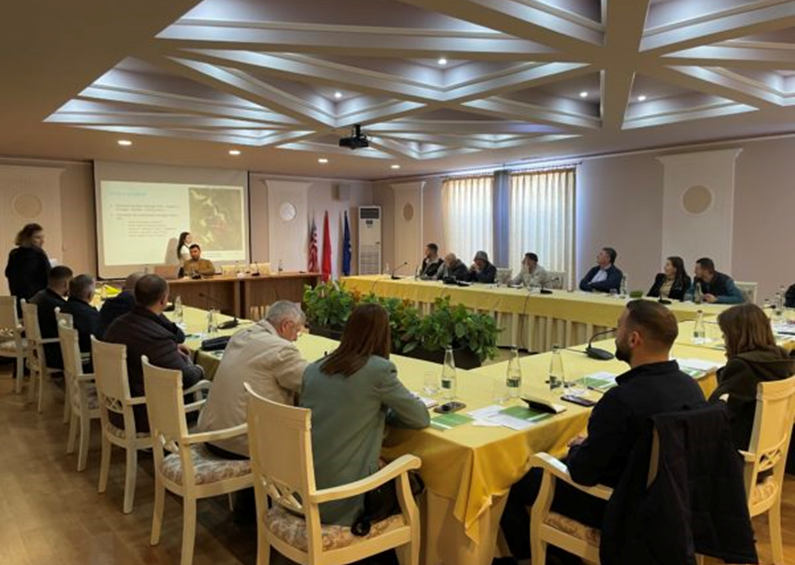Elbasan, April 20, 2023. Representatives of civil society organizations and local institutions of Korçë, Berat and Elbasan districts, took part in the kick-off meeting of the latest initiative of EcoAlbania, to promote the sustainable development of the ecological corridor “Polis-Valamarë-Rungajë -Moravë-Gramoz” – an important corridor that connects five protected areas in the southeast of Albania.
This meeting also marks the start of the implementation of a series of planned activities within the project “Sustainable management of ecological corridors in the area of Polis-Valamare-Rungaje-Moravë-Gramoz” and aims to promote cooperation between local actors of the ecological corridor. While the emphasis of this meeting was on the importance of the corridor and the need for its sustainable management to support long-term natural conservation and fulfill legal obligations as part of the provisions of the Convention for Protection of Biodiversity, the law on protected areas, and the law on the protection of biodiversity.

The event was attended by representatives from a diverse range of organizations, including the six municipalities of Librazhd, Prrenjas, Gramsh, Maliq, Skrapar, Regional Administration of Protected Areas Berat and Elbasan, the Prefectures of Berat, Elbasan, and Korce, NGOs, academics, environmental experts, donors, organizers, etc.
The discussions of the participants focused on various topics, including the introduction of the concept of green infrastructure as a legal notion regulated by law, the need for legal changes to support the ecological corridor concept, and the complexity of determining ecological corridors and integrating them into the legal framework. Participants also discussed the importance of identifying sustainable practices and promoting them within the ecological corridors, the need for more lobbying and advocacy to include ecological corridors as a legal concept.
The purpose of this project is to tackle the loss of biodiversity and connectedness due to fragmentation and unsustainable land use practices, focusing on sustainable governance and awareness-raising activities on the corridors. The project aims to initiate the development of an Action Plan for the corridor, establish a strategic partnership with the PA authority and municipalities, increase awareness on the importance of the ecological corridors through education activities, develop a communication strategy for better presenting the natural values and the vision of the territorial management, and conduct a baseline assessment of the corridor with regard to rural development, environment and territorial planning, ecotourism, and agrotourism potential.
This initiative constitutes a significant stride towards promoting the ecological corridors approach, which in turn ensures the long-term conservation of vital ecosystems. Moreover, the project’s success could serve as an example for other initiatives aimed at preserving biodiversity and promoting sustainable development.
About the ecological corridor:
The “Polis-Valamare-Rungajë-Moravë-Gramoz” ecological corridor is located in south-eastern Albania and represents a remote and mountainous region partially including the municipalities of Librazhd, Përrenjas, Pogradec, Gramsh, Maliq, and Skrapar with an area of around 1600 km2. The corridor provides an important shelter for a significant number of species, allowing for their movement between the existing protected areas. The project area is particularly important for sustaining populations of large mammals, including brown bears, grey wolves, and the critically endangered Balkan lynx.
However, the corridor is significantly threatened by habitat fragmentation due to logging, fires, urbanization, unsustainable land use practices mainly used for agricultural purposes, and poor management of natural resources, risking to compromise corridor’s ecosystems and biodiversity integrity, and its connectiveness. Despite the fact that most of the corridor is excluded from the protected areas network, it remains a significantly important area that enables the movement of important species, especially those that require a vast habitat.
The corridors address the connectivity between five protected areas: Shebenik National Park, Stravaj-Sopot Natural Park, Pogradeci Lake Protected Landscape, Guri I Nikes – Lenie- Valamare, and Mali i Tomorrit National Park.







